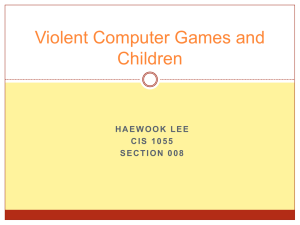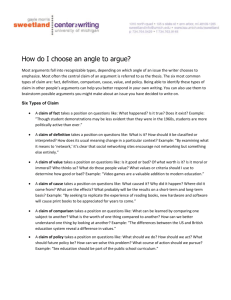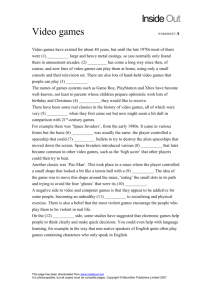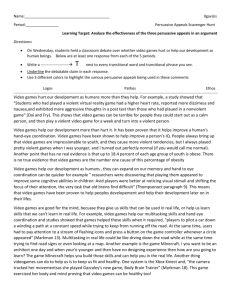Parent*s Guide to Social Media
advertisement
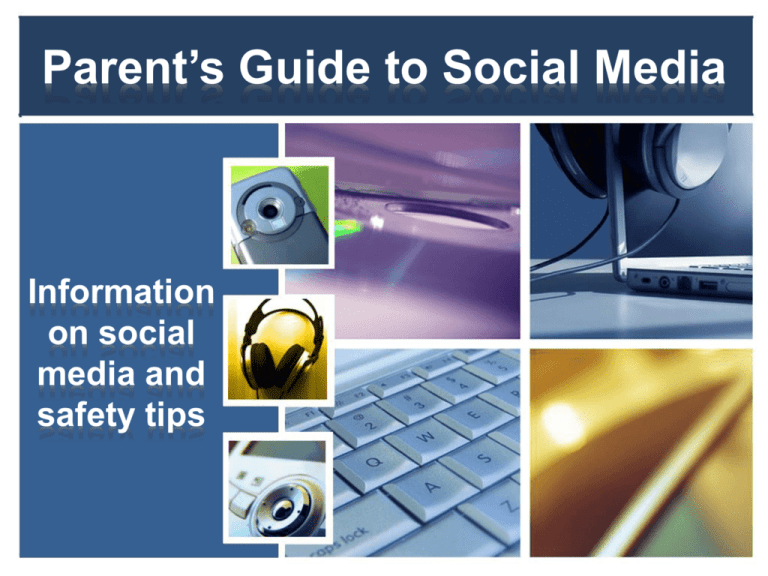
Parent’s Guide to Social Media Information on social media and safety tips Questions for us? If you have a question regarding social media that you would like us to answer, please go to this web address: http://goo.gl/VF3S6J Click on the page and type your question. You may also write it on a notecard. COPPA Children’s Online Privacy Protection Act Instagram Twitter Snapchat Plickers Data 1. Have you seen something that makes you uncomfortable? 41% 59% Yes No 2. What should you do if you see something that makes you feel uncomfortable? 3. What should you do if you see something that makes you uncomfortable? 2% 20% 6% 72% Unplug Tell friends to avoid Tell adult Write it down and don’t visit 3. If someone online tells you she is in 6th grade and her name is Katie, how old is she? 10 4% 69% 25% 13 2% 20 No way to tell 4. If you have been talking to someone online for a long time and they want to meet, which is okay to do? 0% 6% If you bring a friend Only in public 40% Don't meet 58% Tell someone before you go 5. Do you have a social media account? 24% Yes No 76% 6. Are you face to face friends with all followers or those who follow you? 52% 48% Yes No 7. Do you have rules or a contract for your phone/device? 23% Yes No 77% Developmental Impact How much time spent on Media Daily Data is from one 4th Grade Class Anonymous Survey 9 8 7 6 5 # of 4th Graders 4 3 From a class of 23 Students 2 1 0 1 2 3 Hours per Day 4 5 Gaming www.esrb.org Ratings of Games 4th graders Play Data is from one 4th Grade Class Anonymous Survey 20 18 16 14 12 10 # of 4th Graders 8 From a class of 23 Students 6 4 2 0 Everyone Teen Mature Ratings of Games Brain Study – Violent Video Games "Our study suggests that playing certain types of violent video games may have different short-term effects on brain function than playing a nonviolent – but exciting – game," Dr. Mathews and colleagues randomly assigned 44 adolescents to play either a violent video game (Medal of Honor: Frontline) or a nonviolent video game (Need for Speed: Underground) for 30 minutes. The researchers then used an fMRI to study brain function during a series of tasks measuring inhibition and concentration Compared with the group that played the nonviolent game, the group that played the violent video game demonstrated less activity in the prefrontal portions of the brain, which are involved in concentration and self-control, and more activity in the amygdala, which is involved in emotional arousal. • Functional MRI study of Prefrontal Brain- violent and non-violent game players Cyberbullying Safe? Setting your child up for success: Rules about location Setting your child up for success: Monitor the device Setting your child up for success: Open conversations Setting yourself up for success: Face to Face Friends Only Setting your child up for success: Having a family agreement Setting your child up for success: Posting Pictures Setting your child up for success: Dealing with Digital Drama Setting your child up for success: Usernames & Passwords Setting your child up for success: Location Services Setting your child up for success: YouTube • Can look at watch history if you have an account (account is set up through your Google email) • You can delete your watch history • Have to be signed into the account to be able to create a watch list for you to review • Put the safety mode on (scroll to bottom of screen) but need to do this for each browser Setting your child up for success: Google Safe Search Setting your child up for success: Google Safe Search Resources • commonsensemedia.org • parentfurther.com Feedback Please scan the code to access a brief survey or go to this web address: http://goo.gl/89KXpI

